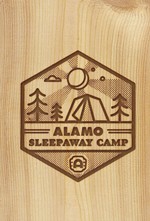How Napster Changed the World and Lost Everything
Alex Winter brings 'Downloaded' to Alamo Slaughter Lane tonight
By Richard Whittaker, 3:25PM, Mon. Jul. 1, 2013
Without Napster, there would have been no iTunes, no Spotify, no Facebook. That's the heart of Downloaded, Alex Winter's film about the cultural rise and commercial crash of the landmark disruptive technology. Winter, who brings the film to Austin tonight, said, "The pioneer often gets slaughtered, and the settler often profits."
There's a certain comedy in the situation. Winter became famous as one half of the time-traveling rockers who save the future in the Bill & Ted movies. However, it's doubtful that Bill S. Preston, Esq., would recognize the rock and roll of this future: Stadiums are passe, and music is a bunch of code.
Yet for Winter, it was an obvious story to tell. He said, "I've been very into technology from the get-go – not the Steve Wozniak get-go, but as a layman. I've been doing a lot of stuff in digital effects my whole career, going back into the 80's." By the early 1990s, he became interested in the early online communities, "The BBS and News Group world, so I was very keen to see where the Internet was going to go. It seemed very clear to me in the early 1990s that it was going to change the world radically." The question was how, "then suddenly with Napster in late '98, '99, the 'how' became immediately evident overnight."
What was it that was so radical? Prior to Napster, Winter said, "there were global communities, but they were unstable, they were hard to navigate, they were for tech-oriented people, and they did not connect you to millions and millions and millions of people all over the world. As [Napster founder] Sean Parker says in the movie, the net before then was about connecting one person to one person. After Napster, you were suddenly connected to everybody."
Winter's documentary, which plays at the Alamo Slaughter Lane tonight, tracks the growth, impact and fall of the music sharing service. Aside from the headlines, this was a business with an evangelical streak: The division between their cultural impact, which was huge, and their commercial path, which was a perfect example of how not to monetize a start-up. There's a moment when the original Napster team count up how much money they lost in venture capital and legal payouts, The look on Parker's face, Winter said, "says it all."
Napster may be the dictionary definition of a disruptive technology. Winter compared the Napster to the early days of the printing press as a game change. he said,"It needed to be monetized and corrected. It was naive, it was volatile, but they had a vision and they implemented it, and that's a lot of times how evolutionary things happened in world culture."
He originally sold the story as a narrative drama in 2004, and walked away when it disappeared into the depths of development hell. He said, "I came back to it in 2009 as a documentary just because the world is in such a harangue over these issues that, if I just get out of the way and let these very smart people on both sides tell their story, maybe it would add some helpful conversation."
For Winter, its not about whether Dr. Dre liked Napster or not. He said, "The one thing I didn't want to turn it into was turn it into the same old crap we'd dealt with when Napster was happening, of these pseudo-tough questions about, 'Why did you put out free music? Didn't you know that it was stealing?"
Instead, Downloaded is about a revolutionary moment in culture. Winter saud, "I wanted to make a movie about the rise and fall of this company called Napster. If you want to look at Napster as this stealing machine created by hooligans, you're not going to think that they as a company merit a story. But if like me you do believe that Napster matters – historically, culturally, evolutionarily, it cannot be dismissed. And if you believe that Napster matters, then they absolutely merit an examination of their little company, and how they rose and fell."
Going back to the first days of programming in bedrooms, Winter said he was interested in the ethical component of two guys – Parker and co-founder Shawn Fanning. For Winter, the pair had a vision that was "very pointedly not about stealing music, but about creating a global community and changing the way we consumed our content."
Winter crams in interviews with all the major players – and that means all. From Parker to techno-philosopher Lawrence Lessig, former Recording Industry Association of America president Hilary Rosen to punk pioneer Henry Rollins. The plan was to catch the maelstrom that engulfed the company. Winter said, "I wanted it to be barrage of talking heads, almost like a trial, because that's what it was like for these guys. I wanted to give the audience a feeling of, if you're 17, 18, 19 years old, and you build this thing and you put it on line and you're just a regular middle class kid with no education and no connections like these two guys, what did it feel like? It felt like an onslaught."
And at no time was that onslaught more obvious than the famous Metallica law suit, where the metal band went after the file sharing service in the courts. For Winter, it's a time that needs reappraisal, especially the role of drummer Lars Ulrich. He called the lawsuit "a volatile and dangerous and bold move on his part, but for my opinion, in retrospect, I don't know what choice he had, and I think somebody had to say something." Downloaded even includes a clip from VH1's That Metal Show with Ulrich explaining his reponse, and Winter said he completely agrees with him. "If I'm Lars Ulrich, and I don't know much about emerging technology, and suddenly I hear a song that I'm in the middle of recording that I'm not done with on KROQ because somebody uploaded it to Napster, well, it's easy to play Monday morning quarterback in this day and age, and say, 'It's not Napster's fault, somebody inside the Metallica camp probably leaked that.' But if I'm Lars, I'm going to say, 'What the fuck is Napster?'"
The end result was pure TMZ spectacle, but Winter said that was only to be expected. This was metal and the tech bubble clashing head on. He said, "It was a circus, because rock and roll's a circus, and technology is a circus, and the whole thing was a bit of a show."
Winter doesn't hold with the idea that Metallica were Luddites. "I don't think Lars was blanketly saying I will never embrace technology. He was just saying, we've got to draw the brakes on this sucker. And, to a certain degree, that's what Napster was saying. 'Let's get licensing deals with the labels. Let's not sell any merchandise. They didn't make any money. They weren't charging. They're not like Pirate Bay, who run banner ads and making money while they gave content away. There was no exchange of money." Since then, Metallica has put its entire back catalog on Spotify, Winter said, "and here was Lars and Sean Parker up on stage with their arms around each other."
The Alamo presents Downloaded, 7:25pm, July 1 at the Alamo Slaughter Lane with director Alex Winter in attendance. Tickets available now.
Winter will also be presenting a special screening of his comedy 1993 Freaked 7pm, July 2, at the Alamo Ritz. Tickets available now.
A note to readers: Bold and uncensored, The Austin Chronicle has been Austin’s independent news source for over 40 years, expressing the community’s political and environmental concerns and supporting its active cultural scene. Now more than ever, we need your support to continue supplying Austin with independent, free press. If real news is important to you, please consider making a donation of $5, $10 or whatever you can afford, to help keep our journalism on stands.
Marc Savlov, May 11, 2018
Richard Whittaker, Sept. 13, 2017
May 9, 2025
May 9, 2025
Alamo Drafthouse, Downloaded, Napster, Shawn Fanning, Alex Winter, Sean Parker, Recording Industry Alliance of America










